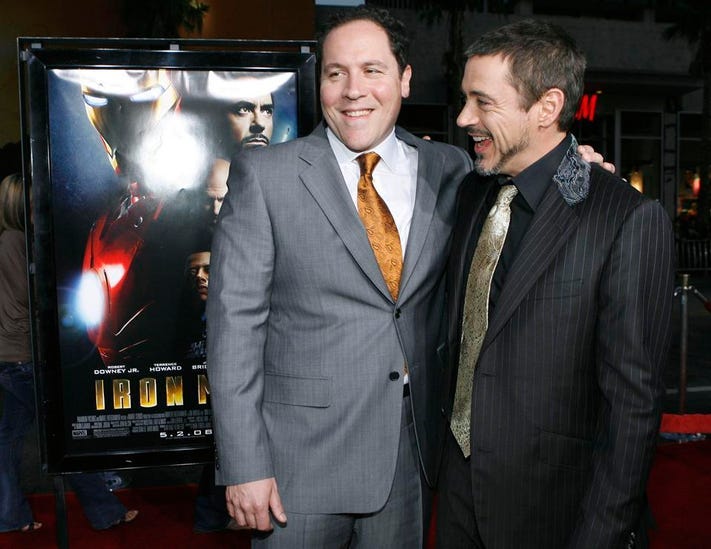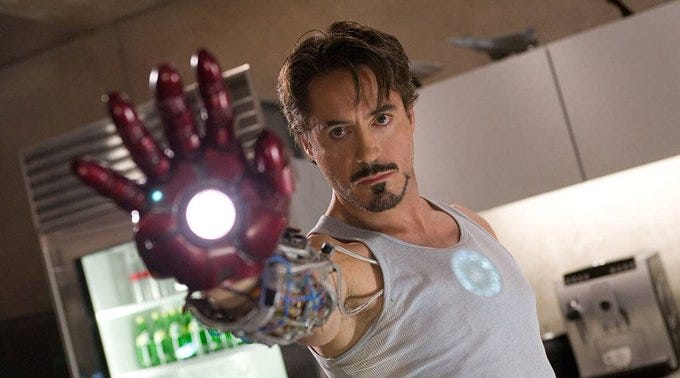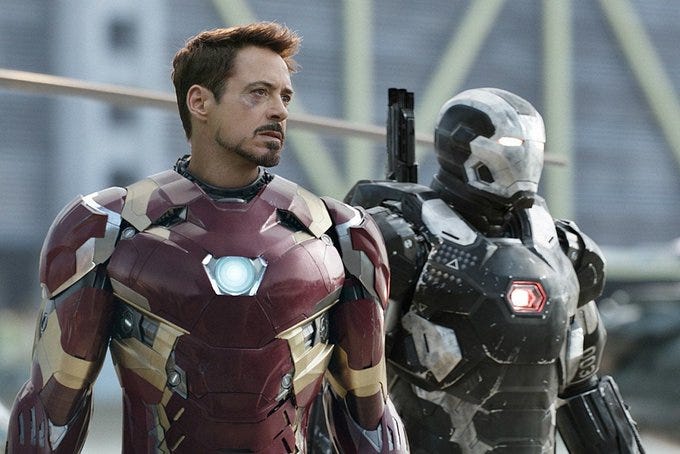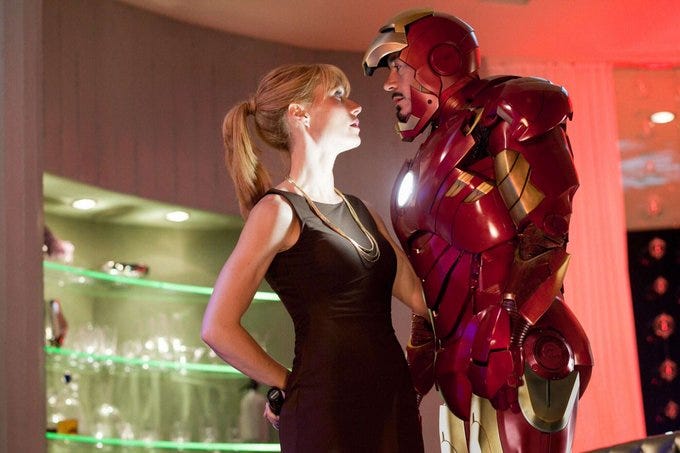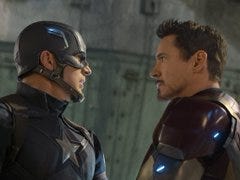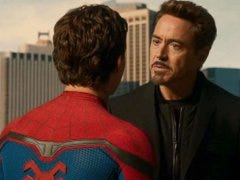How Robert Downey Jr. made $450m+ as Iron Man
One of Hollywood's most legendary comebacks
When Iron Man came out in 2008, Robert Downey Jr. was *not* a marquee star. He was rebuilding his career and paid a below market rate of $500k.
But the deal terms set him up for one of the great acting comebacks ever and he’s earned $450m+ as Tony Stark.
Let me explain how.
Today’s SatPost is brought to you by Bearly.AI
Why are you seeing this ad?
Because I co-founded an AI-powered research app called Bearly AI. And I really like putting blue buttons in this email. If you press this blue button below, you can try AI-powered tools for reading (instant summaries), writing (ChatGPT) and text-to-image art (literally type some text and get a wild image).
Robert Downey Jr. as Iron Man
The Marvel Cinematic Universe (MCU) we know today was a long shot in the early 2000s.
Marvel was a public co. coming off bankruptcy in 1996 and had sold rights to its best IP (Spiderman, X-Men, Fantastic 4). From 2000-07, films based on the IP minted cash but Marvel made little:
In the early-90s, Downey Jr. was actually one of the brightest young stars in Hollywood, receiving a Best Actor nomination for “Charlie Chaplin” in 1992 (@ 27yrs old).
In the 2nd half of the decade, though, he dealt with drug addition, arrests and jail stints before going clean in 2001.
While Downey Jr. resuscitated his career, Marvel bet everything to produce its own content. In 2005, it signed a 8yr/$525m financing deal with Merrill Lynch to create films around Marvel’s remaining “B-list” characters (with the IP as collateral for Merrill):
Marvel had plans for a full Avengers film, but needed a 1st win. It wanted to do a character that never had a live-action film: they chose Iron Man but couldn’t even use Merrill’s cash for it. Why? New Line Cinema owned the rights to Iron Man (and these rights only reverted back *after* the Merrill deal was signed).
In 2007, Marvel went all in on Iron Man with a budget of $140m (for reference, its operating cash flow in 2006 was $158m).
However, Tony Stark was not a traditional muscle-bound super hero and needed a specific type of actor to convey both swagger and vulnerability.
Downey Jr. had acting chops but wasn’t an action lead. Director Jon Favreau wanted him and producer Kevin Feige backed it, calling the decision the “biggest risk” for the MCU. Crucially, Downey Jr. bet on himself: he took a low base ($500k) in exchange for a % of box office.
That first film kicked off an incredible run (based on estimates from Comic Book Resources).
Iron Man (2008)
It was a smash hit and took in $585m globally. Downey Jr. was perfect in the role and made $2m with backend (it would only get bigger from here).
Marvel’s ability to make its own smash film attracted a major fish: Disney bought Marvel for $4B in August 2009.
Iron Man 2 (2010)
The Iron Man sequel was released a few months after Disney’s acquisition. With the success of the first film, Downey Jr. negotiated himself a huge pay raise: $10m base + backend. The film earned $623m at the box office and Downey Jr’s total haul was ~$12m.
The Avengers (2012)
This film is when Downey Jr.’s take started getting absurd. Marvel had released films for Hulk, Thor and Cpt. America in the lead-up.
And the ensemble project made $1.5B. Meanwhile, Downey Jr’s bet on himself really paid off: he made $50m ($10m base + $40m backend).
Iron Man 3 (2013)
The 3rd Iron Man film was the most lucrative. It grossed $1.2B and Downey Jr. made another $50m ($10m base + $40m backend).
Downey Jr’s leverage was huge but Marvel didn’t make another Iron Man film. It diversified away from him — and hedged key man risk — by reducing Downey Jr’s future screen time.
Avengers 2 (2015)
The film made $1.4B and Downey notched $60m. In the lead-up to its release, Marvel made a new Thor and Cpt. America flick as well as Guardians of the Galaxy.
By raising the star of the other actors, Marvel was hoping to gain some negotiating leverage with Downey Jr.
Cpt. America: Civil War (2016)
Prior to this film, Chris Evans (Cpt. America) said he might quit MCU to pursue directing. The threat of losing a leading man put Downey Jr back in driver seat.
Civil War made $1.2B and — in a reduced role — he still made $64m ($50m + $14m).
Spider-Man: Homecoming (2017)
This was the first Spidey flicked co-produced by Disney (along with Sony). To do it right, the studio brought in Iron Man for a cameo.
While Downey Jr’s screen time commitment was low, it was pricey: he made ~$1m per minute of screen time ($10m total).
Infinity War (2018) + End Game (2019)
The final two Avengers were the 19th and 22nd MCU films. It was 10+ years in the making. Infinity Wars made $2B and End Game made $2.8B. Downey Jr’s haul — with backend — were $75m and $130m, respectively!
Across 9 films, Robert Downey Jr. has earned an estimated $453m from playing Iron Man. For Marvel, he’s been worth every penny.
Without Downey Jr. as Tony Stark, there’s no Disney deal. There’s no MCU. And there aren’t 27 MCU films that earned $25B+.
What a comeback.
Other sources:
CNN:https://money.cnn.com/magazines/fortune/fortune_archive/2007/05/28/100034246/index.htm
Washington Post: https://www.washingtonpost.com/business/2019/04/29/robert-downey-jr-marvel-created-box-office-streak-that-few-thought-was-possible-now-they-are-doing-something-even-more-surprising/
Marvel 10K: https://www.sec.gov/Archives/edgar/vprr/0704/07049254.pdf
Hollywood Reporter: https://www.hollywoodreporter.com/movies/movie-news/robert-downey-jrs-massive-payday-tops-avengers-endgame-star-deals-1205835/







